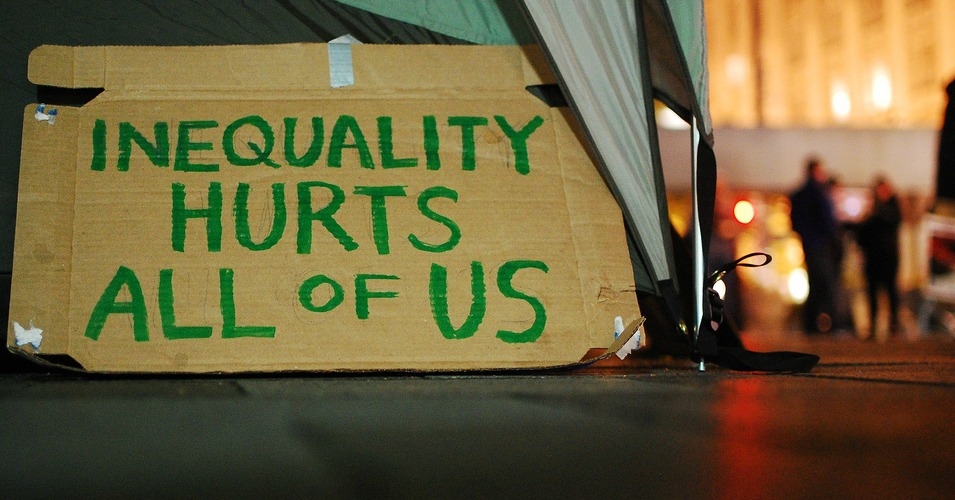
Economic Inequalities: Will it ever end?
Image: Dean Chahim/Flickr/CC
By Lottie Fielding
Worldwide, economic inequalities are said to be on the decline, but this global issue is far from being solved. “The gap between rich and poor people worldwide remains vast as the convergence that has taken place still leaves the average citizen in developing countries, even in fast growing Asian countries, with less than one fourth of the average citizen’s income in advanced countries”. Economic inequalities directly impact individuals’ health; physically and mentally. Undeveloped countries, such as Congo, face severe economic inequality. Congo’s GDP per capita is “equivalent to 3% of the world’s average”. Citizens averagely earn less than $400 a year, which is significantly poor compared to Qatar where citizens averagely earn $100,00 a year. This striking difference in income illustrates the sheer depth of economic inequality that still exists in our societies today.
In these undeveloped countries, “for every 1,000 children born, 39 will die before their 5th birthday. Most under-5 deaths are preventable”. 3.9% of children start life with death following shortly after, due to lack of economic capital. Think about the damage that does for a society; families losing loved ones, the limited healthcare resources overwhelmed, and the fear of bringing a child into the world knowing they may not make it. The economy shapes people’s lives all over the world. The rich live a privileged life knowing that they are able to afford any needed healthcare costs and are more likely to stay healthy due to luxury living conditions that others completely lack.
Sociologist ‘Marshall’ identifies principles that may justify inequalities that individuals face. In some instances, these principles are accurate. However, most living in poverty did not make decisions which led them to live in such an unjust position, they were simply born into it. “Children are more than twice as likely as adults to live in extreme poverty”. Living in an undeveloped country immediately disadvantages citizens; lack of job opportunities, insufficient education, scarce healthcare and so on. According to Branko Milanovic (2016), 50-60% of difference in income is due to the stark income differences between countries where people live and at least 50% of your income is determined by where you live. It is hard for these deprived individuals to get out of these unfair situations when they have been born into them. How are they meant to? No money, no education, no support. This is where economic inequalities may result in crime.
“The 2009/10 BCS found that the risk of being a victim of any household crime was higher in the most deprived areas compared with the least deprived areas in England”. Being stuck in poverty causes frustration and anger, you are being held back from living life to the full potential. People find thrill in committing crimes; they can release their anger and could gain something financially, if they were to burgle someone’s house for instance. In desperate situations its common for people to act out and this is where the trend of crime and poverty comes into play. It is a vicious cycle and many struggle to get out of this unfortunate position.
So, what can be done to end this cycle of economic inequality? Global issues like this are hard to tackle as they are on such a vast scale. It is apparent that national economic inequalities are on the rise, so the world is still to solve this problem, despite the inequality decreasing in a global extent. Undeveloped countries need further support from other developed countries to help them get out of their poverty-stricken disaster. They need funding to enrich education systems, to get more adequate healthcare resources and put measures in place so individuals who face further disadvantages in life can access food, water, and shelter. Reflecting on Durkheim’s idea of the organic analogy, if all countries worked together like the organs of the human body do, we would function much better worldwide. Economic inequality gaps would decrease as economic capital would be distributed more evenly, rather than the rich having it all whilst others are left to suffer.
Sources:
Geographic Patterns of Crime, Neill Higgins, Paul Robb and Andrew Britton, p.165. Available at: https://assets.publishing.service.gov.uk/government/uploads/system/uploads/attachment_data/file/116360/hosb1210-chap7.pdf (Accessed: 7 November 2020)
Children International, Global Poverty Facts, Facts and Stats about Poverty around the World. Available at https://www.children.org/global-poverty/global-poverty-facts/facts-about-world-poverty (Accessed: 7 November 2020)

0 Comments